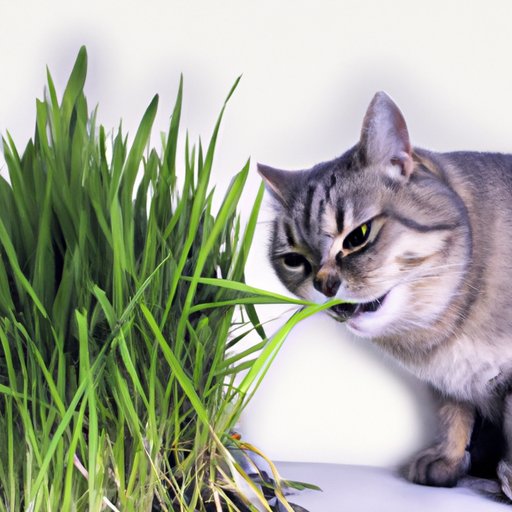Introduction
It’s not uncommon to see cats munching on blades of grass outside or in your own home. But why do cats eat grass in the first place? Is it actually good for them? In this article, we’ll explore the pros and cons of cats eating grass, as well as the potential risks and common myths associated with it.

Exploring the Benefits of Grass for Cats
Let’s start by taking a look at some of the potential benefits of cats eating grass. Eating grass can provide cats with a number of nutritional and health benefits, as well as stimulation and entertainment.
Nutritional Benefits
Grass contains chlorophyll, which is a natural source of vitamins and minerals that are beneficial for cats. It also contains fiber, which helps cats digest their food more efficiently, as well as other nutrients like carotene and lutein.
Stimulation and Entertainment
Cats often enjoy chewing on grass as a form of stimulation and entertainment. For indoor cats, it can provide a way to explore and interact with their environment. For outdoor cats, it can help keep them occupied and prevent boredom.
Health Benefits
Eating grass can also help cats with digestion and hairball control. The fiber in grass helps cats to break down their food more easily and pass it through their digestive system. The fibers can also help cats expel hairballs that they may have ingested while grooming themselves.
Is Eating Grass Good or Bad for Cats?
While there are some potential benefits to cats eating grass, there are also some potential risks. Knowing the potential risks can help you decide if it’s safe for your cat to eat grass.
Potential Risks
The most common risk associated with cats eating grass is that they may ingest toxic plant material. Certain plants, such as lilies, are highly toxic to cats and can cause serious illness. If you’re concerned about your cat eating toxic plants, it’s best to keep them away from any potentially dangerous plants.
Common Myths
There are some common myths about cats eating grass, such as that it will make them sick. However, there is no scientific evidence to support this claim. In fact, grass can be beneficial for cats when eaten in moderation.

Common Questions About Grass Eating in Cats
Now that we’ve explored the potential benefits and risks of cats eating grass, let’s take a look at some common questions about grass eating in cats.
What Kind of Grass Should Cats Eat?
If you want to provide your cat with grass, it’s best to use organic, pesticide-free grass. Cat grass is a popular option, as it is specially formulated for cats and contains no harmful chemicals. You can find cat grass at most pet stores or online.
How Much Grass is Too Much?
It’s best to limit the amount of grass your cat eats to avoid any potential risks. Too much grass can lead to an upset stomach or other digestive problems. As a general rule, it’s best to limit your cat’s grass intake to no more than once a week.
Are There Any Alternatives to Grass?
If you don’t want to provide your cat with grass, there are a few alternatives you can try. You can purchase specially formulated cat treats that contain grass or other plant-based ingredients. You can also grow a variety of cat-friendly plants indoors, such as wheatgrass or alfalfa.
A Guide to Understanding Why Cats Eat Grass
Understanding why cats eat grass can help you decide if it’s safe for your cat to eat grass. Here are some possible reasons why cats may be drawn to grass.
Dietary Needs
Cats may be drawn to grass because it provides them with essential vitamins and minerals that they may not be getting in their diet. Eating grass can help cats get the nutrients they need to stay healthy.
Behavioral Reasons
Cats may also eat grass as a way to explore their environment. For indoor cats, it can provide stimulation and entertainment. For outdoor cats, it can help keep them occupied and prevent boredom.
Natural Instincts
Finally, cats may eat grass as a way to induce vomiting. Cats are naturally prone to eating grass to help them expel indigestible items, such as hairballs, from their stomachs.
Conclusion
In conclusion, cats eating grass can provide a number of benefits, including nutritional and health benefits, as well as stimulation and entertainment. However, it’s important to be aware of the potential risks, such as ingesting toxic plant material. It’s also important to understand why cats may be drawn to grass in the first place. Ultimately, it’s up to you to decide if it’s safe for your cat to eat grass.
(Note: Is this article not meeting your expectations? Do you have knowledge or insights to share? Unlock new opportunities and expand your reach by joining our authors team. Click Registration to join us and share your expertise with our readers.)
